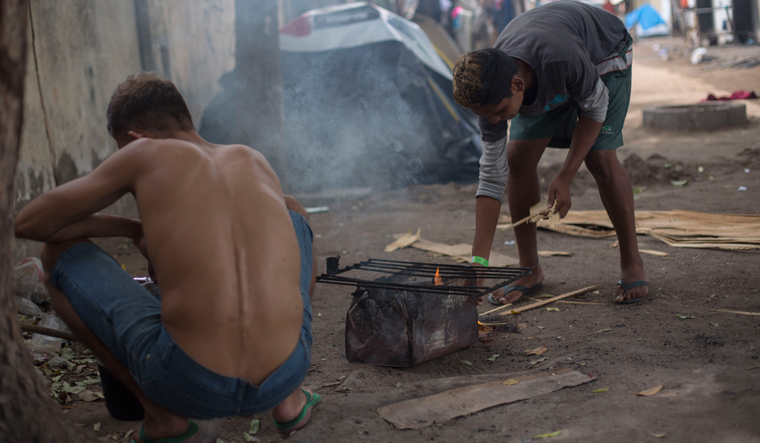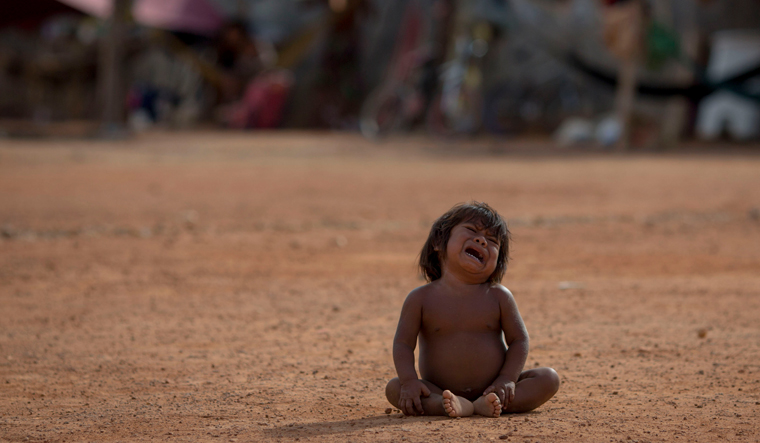Alejandro Manuel Mago Coraspe is an inmate at the Vista Hermosa prison in Bolivar, a city in northern Venezuela. The 41-year-old is serving a nine-month sentence for vehicle theft. He was hospitalised recently for complications from food poisoning. Coraspe was so hungry that he ate dead rats found in the prison's garbage dump, and the bones and cartilages of the rats obstructed his intestine. After he collapsed in his cell, he was taken to a hospital and it is a miracle that he survived. Welcome to the new Venezuela, where staying alive is a luxury today.
It is very difficult to associate Venezuela with poverty, which was once a poster child of prosperity in Latin America. The country is blessed with the world's largest proven oil reserves. At 297.6 billion barrels, it is ahead of even Saudi Arabia, which has reserves of 268 billion barrels. Oil revenues account for 95 per cent of Venezuela's export earnings and a quarter of its GDP. Till 2014, when global oil prices were above $100 a barrel, the Venezuela appeared to be doing alright. The fall in oil prices, however, changed everything.
Political instability also added to the crisis. Under Hugo Chavez, the charismatic president who died in 2013, Venezuela had remained a relatively stable and prosperous country. While Chavez was accused of dictatorship and crony capitalism under a facade of socialism, he managed to lift millions out of poverty. He was also a powerful figure in the international arena. His economic model, however, worked when oil prices were high. But his systematic undermining of infrastructure, especially in the petroleum sector, is now hurting the country.
Chavez completely overhauled the manner in which Venezuela's state-owned petroleum company Petroleos de Venezuela (PDVSA) had been working. He ended its independence, made it report directly to the president, removed the oversight by the central bank, abolished provisions by which a percentage of the profits had to be deposited with the central bank, politicised personnel appointments, dismissed technocrats who were not aligned with his political ideology and literally took over the behemoth's day-to-day running. Profits earned by the company were used to finance his pet projects, pay off his supporters and subsidise friendly foreign regimes like Cuba. It hurt production drastically. With oil prices hitting a peak of $147, PDVSA still managed to show some profits, despite Chavez's experiments. In fact, between 1999 and 2017, the company earned more than a trillion dollars, but there are no records about where it all went. And, as oil prices started to fall, the economy just crumbled.
After Chavez died of cancer in 2013, his protege Nicolas Maduro took over as president. Maduro, a disciple of the late Sai Baba, however, turned out to be a poor administrator and inefficient economic manager. Under him, Venezuela has been suffering a massive economic decline, even steeper than the Great Depression of 1929 that ravaged the western economies, especially the United States. As many as 87 per cent of Venezuelans are now classified as poor, up from 48 per cent in 2014. In the same period, the country has lost one-third of its GDP. The minimum wage in Venezuela is not sufficient to meet even 10 per cent of the basic food needs of a single person.
The International Monetary Fund has warned that inflation rates could hit 2,300 per cent by next year. Nine out of ten households in the country do not have food to survive. The mortality rate of children under four weeks has increased by 100 times between 2012 and 2015, while maternal mortality rate has gone up 30 per cent. In the case of infants, acute malnutrition is the leading cause of death. Communicable diseases like malaria, dengue and chikungunya have become alarmingly common.
Venezuela's capital Caracas, today, is considered to be the most dangerous city in the world. Mothers are forced to steal and rob food and medicines for their children. Some of them are quietly leaving their children in orphanages. Hospitals do not have medicines. Grocery stores are empty. If there are provisions left, desperate gangs of hungry men and women would rob them immediately. Young children, some of them not even 10, leave home to join street gangs and fight for food or even for the privilege to pick through waste bins and dumpsters.
Maduro, however, is in no mood to listen. He says the present crisis is an imperialist conspiracy orchestrated by western nations led by the United States. Political opposition in the country is in disarray. The Venezuelan National Assembly, which was elected in a free and fair election, was disbanded by the Supreme Court controlled by Maduro, as a majority of its members were opposed to him. There was widespread opposition to this move. Last year, hundreds of thousands of Venezuelans were out on the streets protesting against Maduro's policies. But the protests were ruthlessly put down by the Bolivarian National Guard, which functions almost like Maduro's private army. About 120 people lost their lives in the protests. In the place of the National Assembly, Maduro has set up a Constituent Assembly, with members personally chosen by him.
Maduro has now announced snap presidential elections to be held on April 22. The opposition coalition, the Democratic Unity Roundtable, had decided to boycott the polls. However, because of the lack of unity within the opposition ranks, one of its leaders, Henri Falcon, a former provincial governor has announced his decision to challenge Maduro. The opposition alliance has since expelled Falcon.
Venezuela, meanwhile, is facing a major refugee crisis as people are fleeing the country in droves. Between January and June last year, as many as 52,000 Venezuelans applied for asylum abroad—15,000 in the United States alone. More than 40 lakh Venezuelans—which is more than 10 per cent of the country's population—are now refugees.
Danny Bahar, an economist with the Brookings Institution, has predicted that the Venezuelan refugee crisis could eclipse Syria and Rohingya. In the past few months alone, more than 6,00,000 Venezuelans have fled to neighbouring Colombia, 30,000 to Brazil, 40,000 to Trinidad, and 20,000 to Aruba.
There is no end in sight to the crisis. US Secretary of State Rex Tillerson said last month that Maduro could be deposed by a military coup. “In the history of Venezuela and South American countries, it is oftentimes that the military is the agent of change when things are so bad and the leadership can no longer serve the people,” said Tillerson. Yet, the military is divided. Several senior officers are loyal to Maduro and there is a powerful espionage network manned by Cuban agents which deter officers who might be thinking of a plan to overthrow the president.
Nearly 40 per cent of the Venezuelans are now dependent on government handouts for food. They are given imported boxes, which usually contain some pasta, rice, powdered milk and canned tuna, which are delivered once in three weeks. The boxes are given only to those who possess food cards issued by the government. In a country where people are forced to choose between food and medicines, such coercive tactics go a long way in ensuring the longevity of the regime. And, sitting atop the world's largest oil reserves, a once proud nation continues to suffer.




